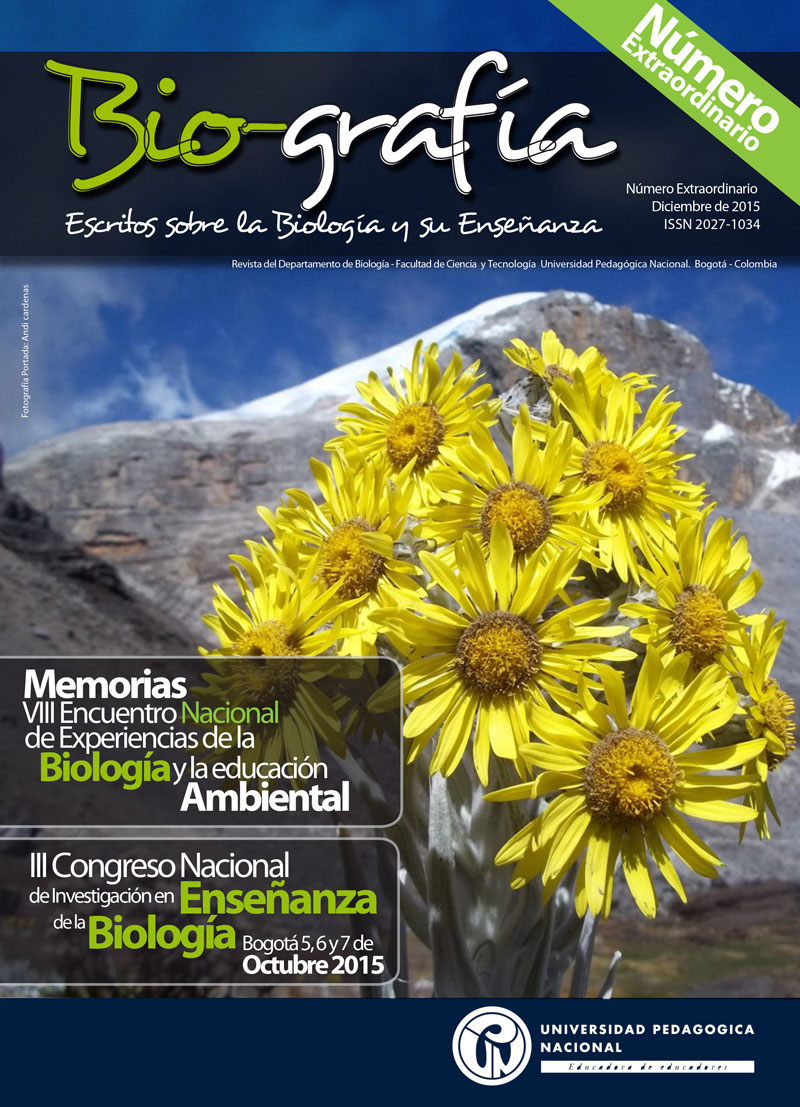EL CONOCIMIENTO DIDÁCTICO SOBRE LA CÉLULA Y EL ANÁLISIS CRÍTICO DE LAS PROPUESTA (ORIENTACIONES) DE ENSEÑANZA DE DOS PROFESIONALES DEL ÁREA BIOLÓGICA QUE EJERCEN EN LA EDUCACIÓN SECUNDARIA
DOI:
https://doi.org/10.17227/20271034.vol.0num.0bio-grafia1090.1101Resumen
La enseñanza, aprendizaje y evaluación de la ciencia que se enseña para su aprendizaje, es, de permanente interés. De la misma forma lo es, el análisis crítico que se debiera realizar sobre el hacer dentro de un contexto y el conocimento –profesional- que declara y explicita el profesorado en la enseñanza y evaluación para el aprendizaje resultando de interés explorar, el conocimiento didáctico y su análisis crítico a la hora de intencionar y proponer u orientar la enseñanza. El objetivo de este trabajo es: Caracterizar el conocimiento didáctico, desde una mirada crítica de las orientaciones de la enseñanza de profesionales del área biológica, sin formación pedagógica, que ejercen -como profesores- en la educación secundaria través de un cuestionario CoRe aplicado a los profesores. y la propuesta (test) de razonamiento de Paul y Elder (1997). Los resultados revelan que los propósitos de enseñanza y aprendizaje que declaran estos profesores son lograr la comprensión de la célula y el desarrollo de habilidades científicas. No obstante, éstos no consideran la naturaleza evolutiva del conocimiento científico. Ni tampoco es posible identificar con exactitud los elementos del razonamiento que siguen los profesores para orientar la enseñanza.
Descargas
Citas
ALVARADO, C. y GARRITZ, A. (2012). Un acercamiento al conocimiento didáctico de acidez y basicidad, de profesores mexicanos de Bachillerato y Licenciatura, X Congreso Nacional de Investigación Educativa.
BANGERT-DROWNS, R. L., & BANKERT, E. (1990, April). Meta-analysis of effects of explicit instruction for critical thinking. Paper presented at the meeting of the American Educational Research Association, Boston, MA. (ERIC Document Reproduction Service No. ED 328 614)
CARTER, K. (1990). Teachers’ knowledge and learning to teach. En R. Houston (ed.), Handbook of Research on Teacher Education. Nueva York: Mac Millam, pp.291-310.
ELDER, L. y PAUL RICHARD (2007). Critical Thinking Competency Standards. Standards, Principles, Performance Indicators, and Outcomes With a Critical Thinking Master Rubric, the foundation for critical thinking. Tomales pp.56.
HALPERN, D. F. (1998). Teaching critical thinking for transfer across domains. American Psychologist, 53 (4), 449-455.
KEELEY, S. M., BROWNE, M. N., & KREUTZER, J. S. (1982). A comparison of freshmen and seniors on general and specific essay tests of critical thinking.
PERKINS, D. N. (1989). Reasoning as it is and could be: An empirical perspective. In D. M. Topping, D. S. Cromwell, & V. N. Kobayaski (Eds.), Thinking across cultures: Third international conference on thinking (175-194). Hillsdale, NJ: Erlbaum.
QUELLMALZ, E. S. (1987). In J. B. BARON & R. J. STERNBERG (Eds.), Teaching thinking skills: Theory and practice (pp. 86-105). New York: W. H. Freeman.
UNDERBAKKE, M., BORG, J. M., & PETERSON, D. (1993). Researching and developing the knowledge base for teaching higher order thinking. Theory into Practice, 32 (3), 138-146.
PAUL, R., & ELDER, L. (1997). Critical thinking: Implications for instruction of the stage theory. Journal of Developmental Education, 20 (3), 34-35.
Descargas
Publicado
Cómo citar
Número
Sección
Licencia
Derechos de autor 2015 Bio-grafia

Esta obra está bajo una licencia internacional Creative Commons Atribución-NoComercial 4.0.
Todo el trabajo debe ser original e inédito. La presentación de un artículo para publicación implica que el autor ha dado su consentimiento para que el artículo se reproduzca en cualquier momento y en cualquier forma que la revista Bio-grafía considere apropiada. Los artículos son responsabilidad exclusiva de los autores y no necesariamente representan la opinión de la revista, ni de su editor. La recepción de un artículo no implicará ningún compromiso de la revista Bio-grafía para su publicación. Sin embargo, de ser aceptado los autores cederán sus derechos patrimoniales a la Universidad Pedagógica Nacional para los fines pertinentes de reproducción, edición, distribución, exhibición y comunicación en Colombia y fuera de este país por medios impresos, electrónicos, CD ROM, Internet o cualquier otro medio conocido o por conocer. Los asuntos legales que puedan surgir luego de la publicación de los materiales en la revista son responsabilidad total de los autores. Cualquier artículo de esta revista se puede usar y citar siempre que se haga referencia a él correctamente.












